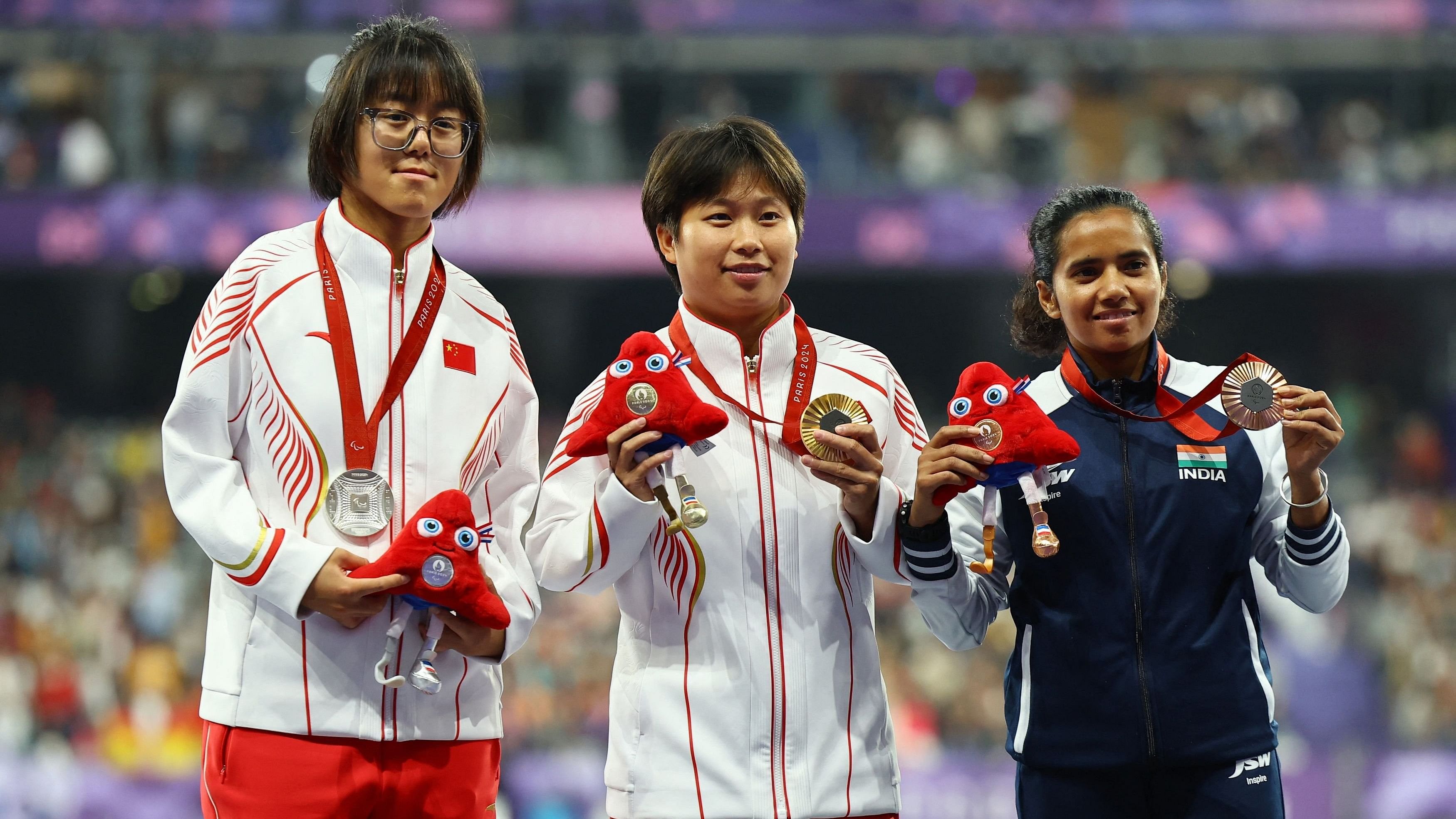
Gold medallist Xia Zhou of China celebrates on the podium during the victory ceremony alongside Silver medallist Qianqian Guo of China and Bronze medallist Preethi Pal of India.
Credit: Reuters Photo
Paris: India's Preethi Pal created history as she became the first Indian woman track and field athlete to win two medals at the Paralympics while clinching the bronze in the 200m T35 category with a personal best time of 30.01 seconds here on Sunday.
The 23-year-old Preethi also became only the second Indian woman to win two medals -- both bronze -- in a single Paralympics after shooter Avani Lekhara who won a gold and a bronze in Tokyo three years ago.
The bronze won by the 23-year-old Preethi was also India's second para-athletics medal in the Paris Paralympics.
World record holder and Tokyo Paralympics champion Zhou Xia of China won the gold with a time of 28.15 while compatriot Guo Qianqian (29.09 seconds) took the silver.
T35 classification is meant for athletes who have coordination impairments such as hypertonia, ataxia and athetosis.
On Friday, Preethi, a farmer's daughter from Muzaffarnagar in Uttar Pradesh, had clinched India's first athletics medal in a Paralympics track event, winning a bronze in the women's T35 100m competition with a personal best time of 14.21 seconds.
All the athletics medals India had won since the 1984 edition of the Paralympics have come from the field events.
In fact, the only other Indian woman track and field medallist in Paralympics is former Paralympic Committee of India president Deepa Malik who won a silver in shot put -- a field event -- F53 category in 2016 Rio Games.
Preethi faced significant physical challenges when she was born as her lower body was plastered for six days after birth. Weak legs and an irregular leg posture made her prone to various diseases.
She underwent various traditional treatments to strengthen her legs, including wearing calipers for eight years from the age of five.
At 17, Preethi's perspective began to change when she watched the Paralympic Games on social media. But her life-changing moment came when she met Paralympic athlete Fatima Khatoon, who introduced her to para-athletics.
With Fatima's support, Preethi competed in the state championships and national events from 2018 onwards. She qualified for the Asian Para Games last year in China, where she finished fourth in both the 100m and 200m sprints.
She moved to Delhi to train under coach Gajender Singh and fine-tuned her running techniques, leading to her winning a bronze medal each in 100m and 200m in World Para Athletics Championships.
She also received out of pocket allowance under Target Olympic Podium Scheme (TOPS) of the government and other financial assistance for training and competition.
Earlier on Sunday, India's Ravi Rongali finished a creditable fifth in the men's F40 shot put final while Rakshita Raju bowed out in the opening round heats of women's 1500m T11 race on the third day of athletics competitions.
Rongali, who had won a silver in the Asian Para Games last year in China, produced a personal best of 10.63m but that was enough for a fifth-place finish in a top-class field.
World record holder Miguel Montero of Portugal won the gold with a throw of 11.21m while Mongolia's Battulga Tsegmid (11.09m) took the bronze.
Reigning Asian Para Games champion Garrah Tnaiash of Iraq took the bronze with a throw of 11.03m while Russian Tokyo Paralympics gold medallist and reigning world para athletics champion Denis Gnezdilov, who was competing as Neutral Paralympic Athlete, was fourth with 10.80m.
F40 class is for para athletes with short stature.
Rakshita, 23, finished last out of four runners in Heat 3 after clocking a timing of 5:29.92s.
The two runners from the three heats qualified for the final.
China's Shanshan He topped Rakshita's heat with a timing of 4:44.66s ahead of Louzanne Coetzee of South Africa, who clocked season best timing of 4:45.25s.
The T11 category is for athletes with visual impairment, which may be entire loss of vision or he or she may be able to perceive light, but have no ability to see the shape of a hand at any distance.
T11 athletes commonly run with guides.